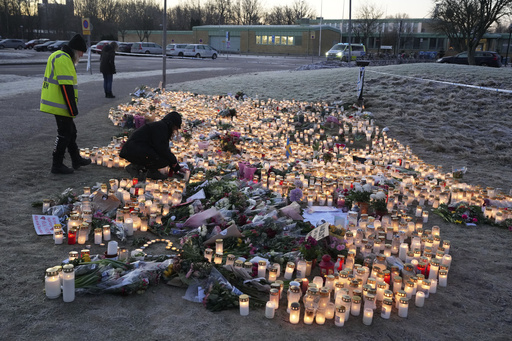OREBRO, Sweden — In a tragic incident this week, Salim Karim Iskef, aged 28, managed to make a final video call to his fiancée, Kareen Alia, as he lay gravely injured following Sweden’s deadliest mass shooting. During the call, he expressed his love for her and asked her to take care of both herself and his mother before the conversation abruptly ended. When Kareen attempted to return the call, she was met with silence, later discovering that Iskef succumbed to his injuries among the ten victims killed when a gunman opened fire at the adult education center in Orebro, where Iskef was training to become a nurse. The couple had recently purchased a home and had plans to marry this summer.
“He had so many dreams within him, and now, sadly, all those dreams are extinguished,” remarked Father Jacob Kasselia of their local Orthodox Christian church, speaking to a Swedish broadcaster. Authorities have indicated that the shooter, whose identity has not yet been disclosed, was linked to the education center where the shooting occurred, and it has emerged that he may have been a former student there. Following the incident, the shooter was discovered deceased with three firearms, ten empty magazines, and a substantial amount of ammunition at his side. The circumstances surrounding his death remain unclear, but police have confirmed they did not exchange fire with him.
Initial investigations revealed at least five victims, all adults over 18, suffered severe gunshot wounds, while a sixth individual received treatment for minor injuries. As detectives continue to probe the case, a clear motive remains elusive. Authorities noted that there were no prior alerts indicating a potential attack and concluded that the assailant appeared to have acted independently. Currently, there are no indications linking the shooting to terrorism.
Campus Risbergska, the adult education center targeted in the attack, provides a variety of programs, including primary and secondary education for adult learners, Swedish classes for immigrants, vocational training, and support for individuals with intellectual disabilities. Located on the outskirts of Orebro, about 200 kilometers from Stockholm, Iskef was pursuing nursing studies after working as a healthcare worker during the COVID-19 pandemic. His family fled Syria from 2014 to 2015 due to the ongoing civil conflict.
Describing the profound loss, Iskef’s sister, Hanan Eskif, shared, “We’ve been together our entire lives—working, studying, and attending church side by side. How can I continue living without him?” Their family held a memorial service at their Orthodox Christian church, though by Thursday evening, they had not yet received Iskef’s body. Hanan expressed the family’s ongoing anguish, saying, “We always look out the window, hoping he’ll come back and knock on the door. We’ve lost our appetite, sleep, everything. We simply sit and wait.”
In response to the tragic event, the Swedish government and the Sweden Democrats have announced intentions to advance proposals aimed at tightening gun control laws. These changes include plans to restrict access to semi-automatic firearms such as the AR-15. Authorities noted that the shooter possessed licenses for four firearms, three of which had been located at the scene, while the fourth has been confiscated. They confirmed at least one of the weapons was a rifle variant.
To legally own a firearm in Sweden, individuals must apply for a license, demonstrating that their intended use is legitimate, such as for hunting or target shooting, and that it won’t be misused. Applicants are required to submit certificates from hunting or shooting courses, where training is necessary. As of the beginning of 2024, there are approximately 660,000 registered gun owners in Sweden—out of a population of roughly 10.5 million—who collectively own about two million firearms and weapon parts that require permits. Among these, roughly 1.6 million are registered for hunting, with another 176,000 designated for target shooting.
Strict regulations mandate that firearms must be securely stored in cabinets approved by local police, and permits for fully automatic and handguns are typically granted only under exceptional circumstances and are usually time-limited. Furthermore, any modification that alters a weapon’s original function can result in the revocation of a permit.




